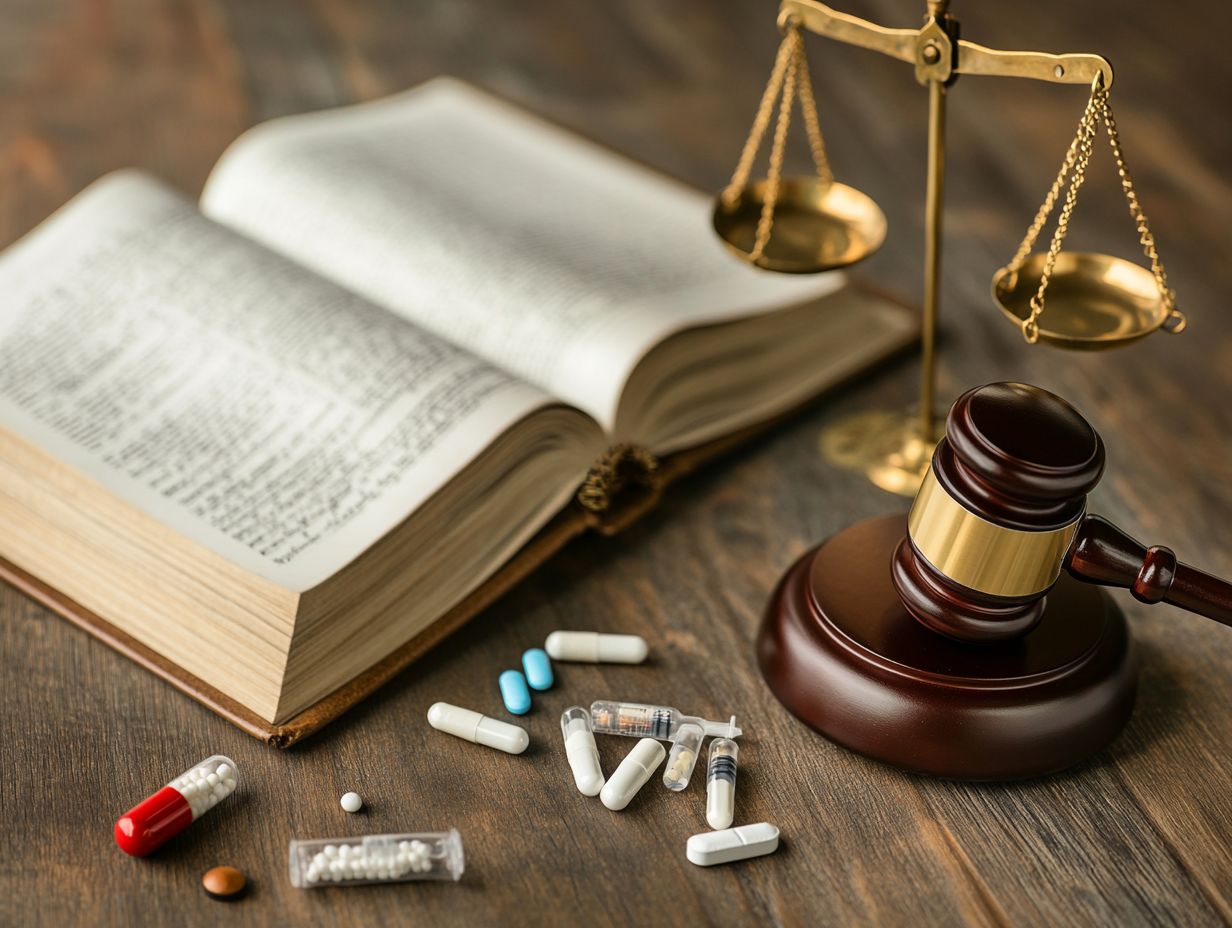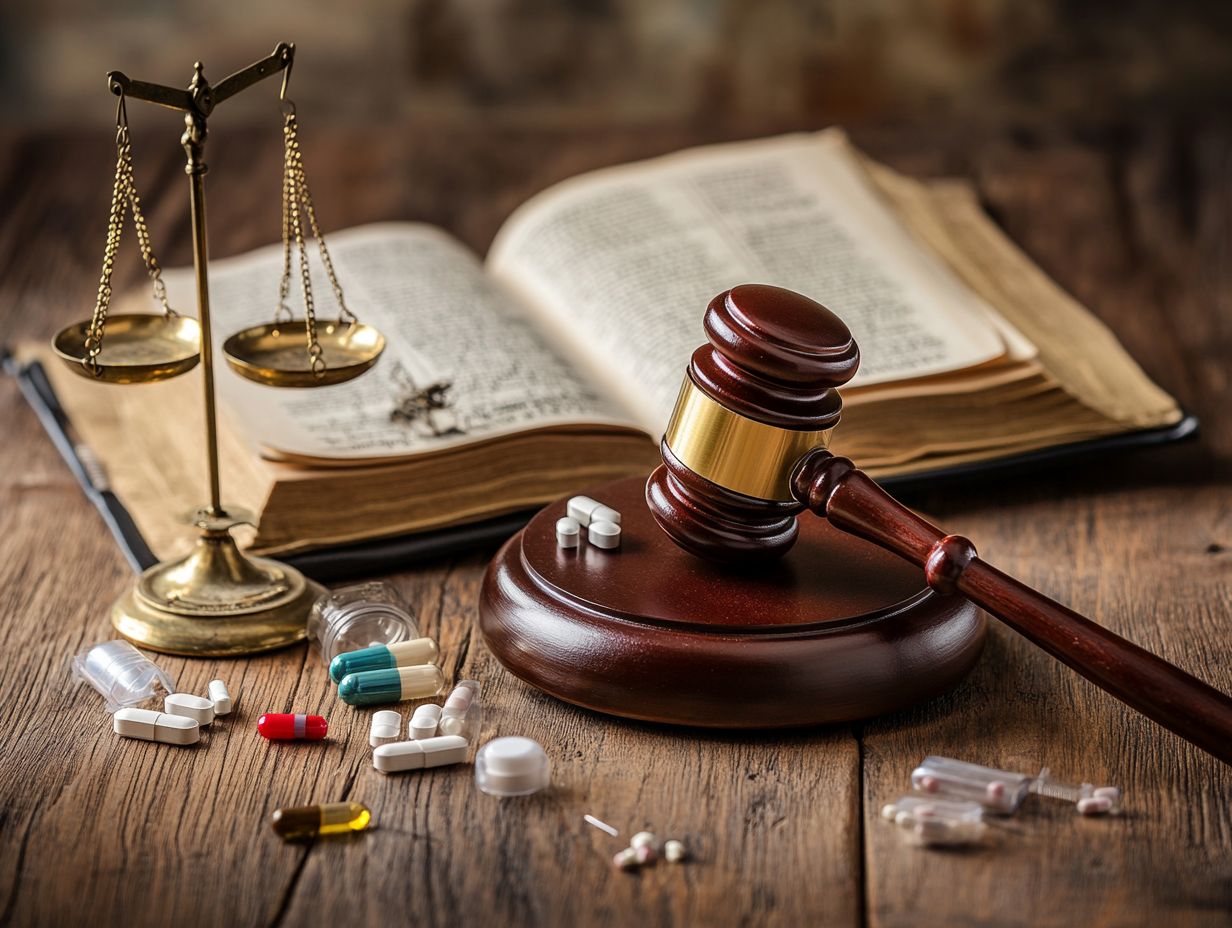Drug Offenses: Types and Legal Implications
Drug offenses are a significant concern in today s society, affecting people and communities deeply.
This article provides you with essential insights if you re facing or curious about these charges, detailing the various types of drug offenses and the intricate legal repercussions that come with them.
You ll discover potential penalties, defenses, and the long-term effects on future opportunities, along with practical steps to successfully navigate the legal system.
Let s dive into the crucial details to address drug-related issues effectively.
Contents
- Key Takeaways:
- Understanding Drug Offenses
- Legal Consequences of Drug Offenses
- Defenses for Drug Offenses
- Navigating the Legal System for Drug Offenses
- Preventing Drug Offenses
- Frequently Asked Questions
- What are the different types of drug offenses?
- What are the potential legal implications of a drug offense?
- What is the difference between possession and distribution of drugs?
- What is the punishment for a drug trafficking offense?
- Are there any defenses for a drug offense?
- How long will a drug offense stay on my criminal record?
Key Takeaways:

Drug offenses refer to illegal activities involving controlled substances (such as narcotics, which are drugs that relieve pain) and can result in severe legal consequences.
Possible punishments for drug offenses include fines, imprisonment, and limitations on future opportunities such as employment and education.
Defending against drug offenses can involve various strategies, and navigating the legal system can be complex, so seeking legal guidance is crucial.
Understanding Drug Offenses
Knowing about drug offenses helps you navigate the criminal justice system.
These offenses encompass a range of illegal activities, including possession of narcotics (drugs that relieve pain), distribution, drug trafficking, and prescription drug fraud.
The legal implications can vary significantly based on the specific type of drug-related offense and the jurisdiction in which it occurs, whether that’s Missouri or Texas. Understanding the legal process for drug crimes helps you make informed decisions about your legal rights and potential defenses.
Definition and Types of Drug Offenses
Drug offenses encompass a range of categories, including drug possession, distribution, and trafficking, with substances like narcotics and cannabis products falling into these classifications.
Each type comes with its own set of legal implications, hinging largely on the specific substance involved. For example, possessing benzodiazepines (a class of drugs used to treat anxiety) without a prescription could land you with misdemeanor charges, while being caught with larger quantities of amphetamines might escalate matters to felony charges.
Opiates, notorious for their potential for abuse, often carry serious legal ramifications when found in substantial amounts, particularly in trafficking scenarios. Fentanyl, given its potency and associated dangers, has faced even harsher penalties under drug trafficking laws.
Understanding the distinction between misdemeanor and felony charges is crucial, as it not only determines the severity of penalties but also significantly affects your record and future opportunities for rehabilitation.
Legal Consequences of Drug Offenses
The legal consequences of drug offenses can profoundly affect your life, encompassing everything from fines and community service to incarceration and mandatory drug education programs.
The severity of these penalties often depends on various factors, including the type of drug involved, the quantity in question, and whether the charge is classified as a felony or misdemeanor. Understanding these nuances is crucial as they can significantly influence your future.
Possible Penalties and Sentencing

Possible penalties and sentencing for drug offenses can vary widely depending on the nature of the charge. Penalties for drug possession are often less severe than those for trafficking and distribution offenses, which can lead to felony charges and substantial fines.
A simple possession charge might result in a misdemeanor, accompanied by minimal jail time or fines. In contrast, engaging in drug trafficking could invoke severe felony penalties, including lengthy prison sentences and significant financial repercussions.
The legal framework in each state, along with the specific jurisdiction, dramatically influences how these laws are enforced. Factors like whether you had the intent to sell, the type and quantity of drugs involved, and your past criminal history can further complicate sentencing outcomes.
Understanding these nuances is essential for grasping the broader implications of drug-related offenses.
Act now to understand your rights and options, and consider seeking legal assistance if you’re facing charges related to drug offenses.
Impact on Future Opportunities
The impact of drug offenses on your future opportunities can be profound. Legal consequences often ripple beyond immediate penalties, influencing your employment prospects and educational possibilities.
These factors can ultimately hinder your personal growth and reintegration into society. A criminal record can erect barriers in various aspects of your life, making it tough to secure stable jobs.
It can also affect your chances of gaining acceptance into educational programs or even finding suitable housing. Employers often conduct background checks, leading to automatic disqualifications, especially in fields that require trust or safety.
Educational institutions impose strict policies regarding applicants with criminal histories, further restricting your access to higher learning. Housing applications can also suffer, as landlords frequently view previous convictions as red flags.
Given these long-term ramifications, joining rehab and treatment programs is crucial for helping you regain your footing and pursue a more promising future.
Defenses for Drug Offenses
When confronted with drug charges, you have a range of defense strategies at your disposal. These can include challenging the legality of a search or demonstrating a lack of intent to sell.
Engaging a skilled criminal defense attorney can significantly improve your chances of achieving a favorable outcome.
Possible Strategies for Defense
Possible strategies for your defense against drug offenses may include suppressing evidence, challenging the legality of the search and seizure, and asserting that you had no knowledge of the illegal substances.
These strategies can profoundly influence the outcomes of your case, potentially leading to reduced charges or even outright dismissal. For example, if the evidence against you was obtained through an unlawful search, it may qualify for suppression, undermining the prosecution’s case.
Challenging the legality of the search could establish crucial precedents, such as the protection against unreasonable searches by the police. Establishing a lack of knowledge is paramount; if you can convincingly argue that you were unaware of the illicit items in your possession, it could shift the burden of proof.
The intricacies of these defenses highlight the importance of skilled legal representation. Experienced attorneys can adeptly navigate the complexities of drug laws and take full advantage of any legal missteps made by law enforcement.

Navigating the legal system for drug offenses can feel overwhelming, especially for first-time or repeat offenders. By understanding the processes involved from the moment of arrest to trial you empower yourself to make informed decisions about your legal representation and defense strategies.
This knowledge not only demystifies the journey but also equips you to approach your situation with confidence.
Steps to Take and Important Considerations
When facing drug offenses, there are crucial steps you need to take and important considerations to keep in mind. Promptly seeking legal guidance and fully understanding the specifics of the charges against you is vital.
Navigating the legal landscape requires careful attention, starting with hiring a skilled criminal defense attorney who specializes in drug cases. This expert will clarify the intricacies of your legal situation and advocate fiercely for your rights.
Next, gather all pertinent evidence, including any documents or witness statements that could bolster your case. Creating a timeline of events related to the charges can help clarify details and strengthen your position.
Exercise caution when speaking to law enforcement; anything you say without legal counsel could be used against you. Additionally, preparing for court appearances is vital. Practicing your responses with your attorney can significantly enhance your confidence and effectiveness during proceedings.
Preventing Drug Offenses
Act now! Preventing drug offenses is vital for a healthier community. This requires a comprehensive strategy that encompasses drug education programs, community service initiatives, and access to effective drug treatment solutions.
By addressing the root causes of substance abuse, you can create a more resilient community and foster lasting change.
Educational and Preventive Measures
Educational and preventive measures are crucial in the fight against drug offenses. Engaging in drug education programs can equip you with the essential knowledge to make informed decisions about substance use and understand the potential legal ramifications.
These initiatives often cater to a wide array of age groups and demographics. They range from school-based programs that inform students about the perils of drug use to community workshops that involve parents and guardians in crafting effective prevention strategies.
These programs do more than share information. They encourage open dialogues, creating a safe space for young people to share their experiences and challenges without the fear of judgment. The effectiveness of these initiatives shines in communities that have adopted early intervention strategies.
By tackling the issue before it escalates, these programs play a significant role in reducing the rate of drug offenses. Integrating legal guidance into these programs clarifies the legal consequences of substance abuse, underscoring the notion that informed choices pave the way for healthier, more legally conscious lifestyles.
Frequently Asked Questions

What are the different types of drug offenses?
Drug offenses can be categorized as possession, distribution, manufacturing, trafficking, and cultivation of illegal drugs.
What are the potential legal implications of a drug offense?
The legal implications for a drug offense can include fines, probation, community service, and even imprisonment, depending on the severity of the offense and the individual’s criminal history. Probation is a court-ordered period of supervision in the community, rather than serving time in prison.
What is the difference between possession and distribution of drugs?
Possession refers to having illegal drugs for personal use, while distribution involves selling or sharing drugs with others. Both are considered drug offenses and can result in legal consequences.
What is the punishment for a drug trafficking offense?
The punishment for drug trafficking can vary depending on the type and amount of drugs involved. It can result in lengthy prison sentences, heavy fines, and a permanent criminal record.
Are there any defenses for a drug offense?
Yes, there are several defenses that can be used for drug offenses, such as lack of knowledge, entrapment (which is when law enforcement induces a person to commit a crime they would not have otherwise committed), or illegal search and seizure by law enforcement.
How long will a drug offense stay on my criminal record?
The length of time a drug offense stays on your criminal record depends on the laws in your state. It can potentially remain on your record for a lifetime and can significantly impact future employment and other opportunities.
Don’t wait until it’s too late get informed now! Join us in understanding how education can change lives!





